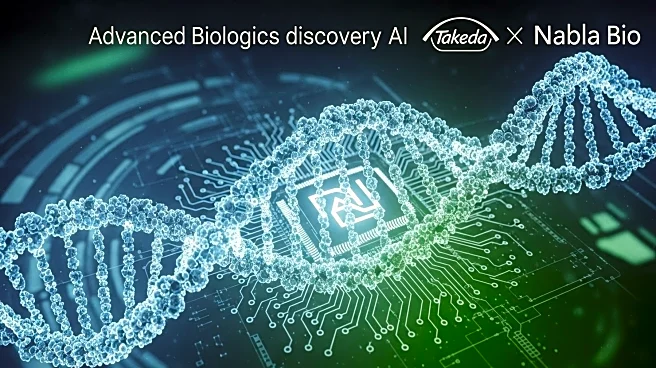What's Happening?
Takeda has announced a multi-year partnership with Nabla Bio, focusing on AI-driven biologics discovery to enhance its early-stage pipeline. This collaboration follows Takeda's strategic decision to exit cell therapy investments, aiming to improve company
margins. Nabla Bio's Joint Atomic Model platform, a generative modeling system, will be central to this partnership, utilizing extensive protein data to design novel de novo biologic therapies. The deal includes immediate payments in the 'double-digit millions' and could exceed $1 billion with success-based milestones. This partnership marks a continuation of Takeda's efforts to innovate in biologics, having previously collaborated with Nabla Bio in 2022.
Why It's Important?
The partnership between Takeda and Nabla Bio signifies a strategic shift towards AI-driven biologics, potentially transforming the pharmaceutical industry. By leveraging Nabla's advanced modeling platform, Takeda aims to develop novel therapies, which could lead to breakthroughs in treating various diseases. This move aligns with broader industry trends where major pharmaceutical companies are increasingly investing in AI technologies to enhance drug discovery and development processes. The collaboration could position Takeda as a leader in next-generation biologics, impacting its competitive standing and potentially leading to significant advancements in medical treatments.
What's Next?
Takeda's collaboration with Nabla Bio is expected to focus on the de novo design of antibodies for multiple targets, although specific indications have not been disclosed. The partnership will also explore multispecifics and challenging targets, potentially leading to custom therapeutics. As Takeda continues to realign its strategic focus, the company is likely to seek additional partnerships or acquisitions to bolster its biologics capabilities. The industry may witness increased AI-driven collaborations, as pharmaceutical companies strive to innovate and improve drug discovery efficiency.
Beyond the Headlines
The shift towards AI-driven biologics discovery raises ethical and regulatory considerations, particularly concerning data privacy and the validation of AI-generated models. As AI becomes integral to drug development, companies must navigate these challenges to ensure compliance and maintain public trust. Additionally, the focus on AI may influence workforce dynamics, requiring new skill sets and potentially impacting employment in traditional drug discovery roles.















